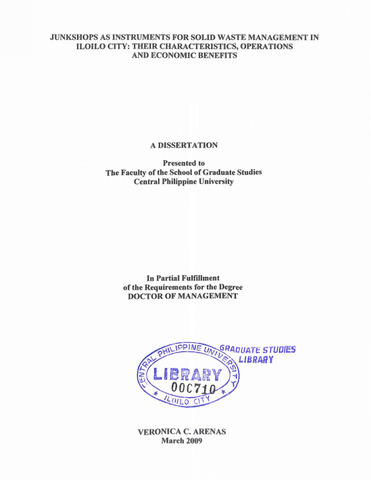Junkshops as instruments for solid waste management in Iloilo City: Their characteristics, operations and economic benefits

Page views
5,392Дата
2009Автор
Thesis Adviser
Defense Panel Chair
Share
Metadata
Показать полную информацию
Аннотации
Many urban governments now face the increasingly difficult problem of managing their solid wastes. Consequently, this study explored the roles of junkshops in solid waste recycling and management. Quantitative and qualitative methodologies were utilized to attain this objective. A one-shot survey was administered to 53 of the 58 junkshops in Iloilo City. Complementary qualitative data were obtained from direct observations and interviews of key informants. Descriptive and inferential statistics were employed to analyze the resulting dataset.
This study revealed that majority of junkshops was unregistered micro-enterprises located mainly in the districts of La Paz, Molo and City Proper. Most had been in business for a maximum of 3 years, had daily operating capital of more than P5,000.00, and monthly earnings between ₱l0,000 to ₱24,999 collecting up to 5 tons of waste weekly (mostly iron/scrap metals). The type of waste collected was related to junkshop characteristics, particularly, location and daily operating capital. Junkshop size, legal xiv status, and status of waste collectors were shown to have influenced the volume of waste collected and, with the number of facilities, number of years in operation, and daily operating capital, they were altogether associated strongly with the net monthly income. Single proprietorship was the common form of organization, with the owner/operator dominating most activities and decisions. Written plans and appraisal systems were nonexistent. The marketing chain was revealed as expanded in favor of more middlemen— wastes from households or offices were passed to waste collectors and itinerant buyers, to traders-consolidators, and finally to factories.
Because junkshops improve waste management and, at the same time, help the economy, LGUs are urged to integrate them in the Integrated Solid Waste Management (ISWM) program, which legal framework already exists. There is a particular need to advocate the roles of junkshops in recycling and sorting at source, and to provide them assistance through industry promotion activities with financial and technical support packages. These steps are deemed essential to long-term sustainability of the enterprises and waste management programs.
Описание
Abstract only
Suggested Citation
Arenas, V. C. (2009). Junkshops as instruments for solid waste management in Iloilo City: Their characteristics, operations and economic benefits (Unpublished Doctoral dissertation). Central Philippine University, Jaro, Iloilo City.
Type
DissertationKeywords
Department
School Graduate StudiesDegree
Doctor of ManagementShelf Location
GSL Theses 650.072/Ar35
Physical Description
xii, 174 leaves


